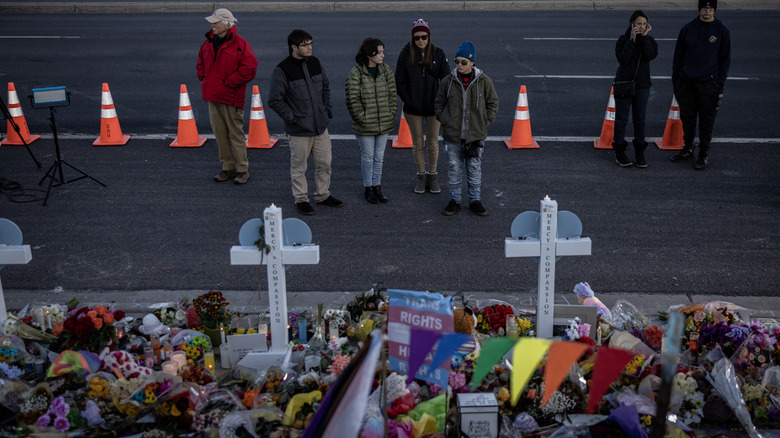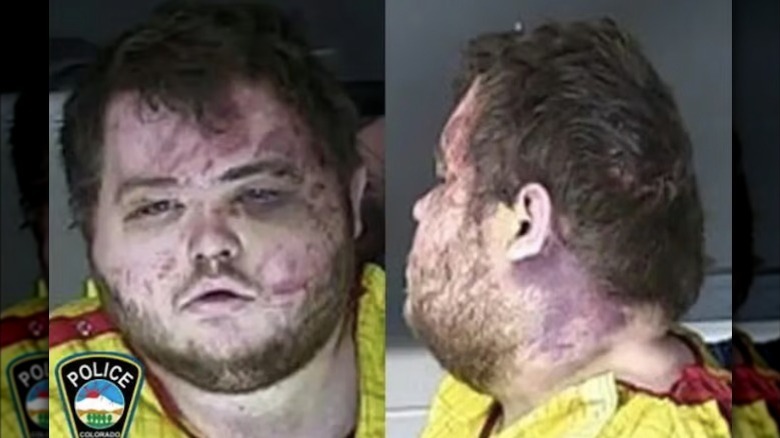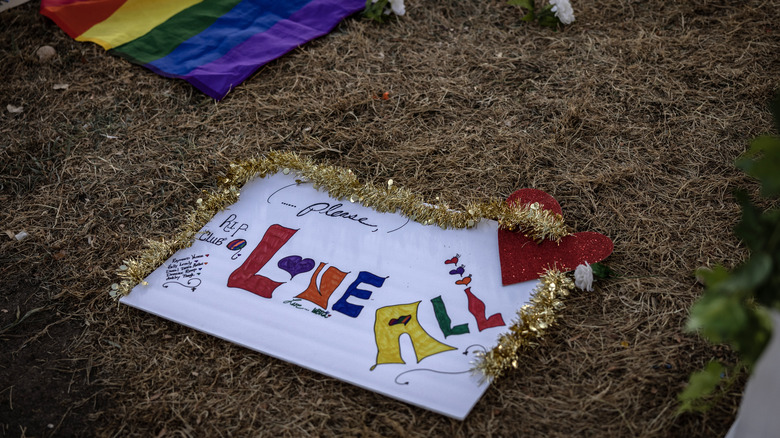The Club Q Shooter's Charges Explained
Just after midnight on November 19, 2022, Colorado Springs Police Officer Connor Wallick entered Club Q, an LGBTQ+ nightclub in Colorado Springs, Colorado. "I could hear people screaming and crying," he recalled in court, according to The New York Times. "I could smell a lot of gunpowder. I could hear music, but it seemed like the music had been turned down before I got there." Inside, he found a bloody scene full of chaos. Besides gunshot victims, Wallick saw a man holding someone down who was wearing body armor. An AR-15-style rifle and magazines were scattered on the ground nearby. Two unarmed patrons had tackled and subdued the suspect.
The alleged shooter, a 22-year-old named Anderson Lee Aldrich, at first denied involvement. But prosecutors allege Aldrich, who identifies as non-binary, had planned the mass shooting that left five patrons dead and at least 19 injured (per KRCC). Aldrich allegedly visited the club more than a half-dozen times and made a crude map of the building's interior before the attack.
A courtroom packed with survivors and family
On February 22, 2023, Anderson Lee Aldrich appeared in El Paso County court for a preliminary hearing, which was packed with survivors of the shooting and the victims' family members (per The New York Times). Among the several hundred crimes prosecutors have charged Aldrich with are a number of hate crimes. To back the allegations that Aldrich allegedly acted out of bias, prosecutors presented evidence that included police testimony. In court, Det. Rebecca Joines alleged none of the people she interviewed who knew Aldrich were aware Aldrich was non-binary, and the interviewees said that Aldrich often used homophobic slurs and expressed anti-LGBTQ+ sentiments. Per LGBTQ Nation, Aldrich's lawyer at one point also referred to them using he/him pronouns in court documents. The suspect also posted a neo-Nazi video to a website, police said.
Aldrich's defense attorneys countered that bias didn't motivate their client, as evinced by their remorse after the shooting. "Aldrich's behavior after this incident says they're sorry, upset, and emotional about what they did," defense attorney Joseph Archambault said in court on February 23, during the second day of the hearing, per Colorado Public Radio. "It's categorically different than someone who targets a group, and that's not what Aldrich did. ... We have someone who was on a lot of drugs and had mental health issues."
If you or someone you know needs help with mental health, please contact the Crisis Text Line by texting HOME to 741741, call the National Alliance on Mental Illness helpline at 1-800-950-NAMI (6264), or visit the National Institute of Mental Health website.
The suspect is facing more than 300 charges
Anderson Lee Aldrich was taking medications for schizophrenia, bipolar disorder, anxiety, depression, and mood regulation, their attorneys told the court (via KKTV). Aldrich's mother described them as having special needs and suffering from post-traumatic stress disorder because of a sexual assault. On the night of the attack, Aldrich claimed to have taken cocaine, Xanax, and methamphetamine (per The New York Times).
Judge Michael McHenry ruled that the bias-related charges could be presented at trial, meaning Aldrich is now facing 323 counts (per El Paso Country 4th Judicial District). Besides the bias-motivated charges, Aldrich is also facing five counts of first-degree murder, along with attempted murder, attempted assault, and other crimes. Aldrich remains in custody without bond pending their next court date in May. Ashtin Gamblin, one victim of the attack who suffered nine bullet wounds, told The New York Times she felt "a sense of relief" that the hate crimes "were going to stick" and called Aldrich a "monster" who needed to be "put away." Aldrich is facing life in prison without the possibility of parole for just the first-degree murder charges.
If you or someone you know needs help with mental health, please contact the Crisis Text Line by texting HOME to 741741, call the National Alliance on Mental Illness helpline at 1-800-950-NAMI (6264), or visit the National Institute of Mental Health website.
If you or anyone you know has been a victim of sexual assault, help is available. Visit the Rape, Abuse & Incest National Network website or contact RAINN's National Helpline at 1-800-656-HOPE (4673).


